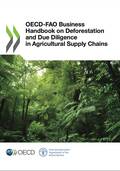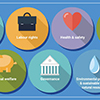Building responsible global value chains for the sustainable production and trade of tropical fruits
Concerned about business risk in avocado or pineapple supply chains?
Global production and trade of tropical fruits has grown dramatically. Tropical fruits are also part of a healthy diet for millions of people and contribute to development in producer countries. The COVID-19 pandemic and concerns about sustainability have shown business risks that must be addressed to ensure continued success in these value chains.
Companies are already taking steps to address sustainability risk in their operations. However, value chains are vulnerable to risks and shocks beyond the control of any single actor. Thus, concerted actions can benefit all industry stakeholders. FAO is leading the project Building responsible global value chains for the sustainable production and trade of tropical fruits, also known as the “Responsible Fruits Project”.
The project:
| helps companies to strengthen or establish risk-based due diligence systems to make their operations more sustainable and resilient to external shocks such as COVID-19; |
| provides a confidential environment for peer learning on pre-competitive issues; |
| identifies measures and good practices to overcome challenges; |
| develops a series of demand-driven guides on technical challenges identified by project participants, including measures and good practices to overcome these challenges and; |
| analyzes the policy environment and incentives, aiming to identify opportunities to accelerate sustainable investment in supply chains. |
The project builds on more than a decade of FAO’s experience of working with the private sector on tropical fruits. This includes facilitating the World Banana Forum, which enables industry players to discuss challenges, seek technical support, share good practice and innovation for sustainability in the banana sector. It also builds on work with over 30 leading enterprises and industry associations to apply the risk-based due diligence recommendations in the OECD-FAO Guidance for Responsible Agricultural Supply Chains.
Benefits of joining
All interested companies, trade associations, and producer organizations involved in the avocado and pineapple value chains may ask to join the project.
Participants will:
▪ guide where the project focuses its resources by identifying priorities and good practices to reduce risk and enhance sustainability;
▪ have their say in the identification of priority topics for technical guides;
▪ learn how others aim to address challenges in pre-competitive issues;
▪ have exclusive access to customized webinars organized by FAO and other experts;
▪ have access to technical guides created by the project.
There is no cost to participate. Confidentiality will be strictly protected.
Featured Resources
-
Adapting to climate change in the tropical fruit industry: a technical guide for avocado producers and exporters
Climate change is impacting global food production systems, making the challenge of feeding the world’s growing population more difficult than ever before.Published: April 2024
-
Adapting to climate change in the tropical fruit industry: a technical guide for pineapple producers and exporters
Climate change is impacting global food production systems, making the challenge of feeding the world’s growing population more difficult than ever before.Published: April 2024
-
Webinar #16: Participatory and innovative approaches to soil mapping, 10 November 2023
Published: April 2024
-
Webinar #17: Occupational health and safety in tropical fruit value chains
Published: April 2024
-
Ideas for incentives to promote sustainable investment in the avocado and pineapple sectors
Incentives are one of many tools that governments can use to promote investment. Incentives may encourage the establishment or growth of a sector and lead to jobs and revenue growth.
Published: April 2024
-
Resilience assessment of avocado and pineapple value chains
Building resilience is important for agrifood systems – such as tropical fruit value chains – to prepare, withstand and adapt to a wide range of risks, including climate and non-climatic shocks and stresses.Published: June 2023
-
Action Report, May 2023 - Building responsible global value chains for sustainable tropical fruits
The FAO led project “Building responsible global value chains for the sustainable production and trade of tropical fruits” (GCP/GLO/022/GER) works with businesses, farmer organizations and other actors in the avocado and pineapple value chains.Published: May 2023
-
Technical Guide No. 1: Gap analysis to support due diligence in the avocado and pineapple sectors
The guide helps tropical fruit companies to compare standards they use with international expectations on due diligencePublished: Feb 2023
-
Technical brief No. 1: Gap analysis tool to strengthen the management of sustainability risks in tropical fruit value chains
Gap analysis tool to strengthen the management of sustainability risks in tropical fruit value chainsPublished: Oct 2022
-
Making avocado and pineapple supply chains more sustainable and resilient
Published: July 2021


















